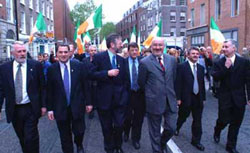 |
Irisch
Republikanische Solidarität
|
 |
'Stormontgate' report disputed
The police Ombudsman's office has clashed with Sinn Fein over a
report which rejects accusations that a 2002 raid on Sinn Fein's
Assembly offices was politically motivated.
In her report, the Police Ombudsman, Nuala O'Loan, did criticise
officers for the heavy-handed scale and manner of the search.
On the basis of intelligence made available to her, the
Ombudsman said the decision to seek a warrant authorising a
search of a specific desk in the Sinn Fein offices was
"reasonable, proportionate and legal".
Mrs O'Loan added: "We have not uncovered any evidence that the
police decision-making was influenced inappropriately".
Sinn Fein's Conor Murphy rejected the Ombudsman's findings and
insisted the raid was politically motivated.
"It is the view of Sinn Fein and indeed the vast majority of
nationalists that the stage-managed raids on the Sinn Fein
offices in Stormont were politically motivated and part of a
wider anti-peace process agenda operating within the PSNI.
"Just because Nuala O'Loan has failed to uncover evidence to
support this does not mean that this widely held belief is
flawed," he repeated yesterday.
The raid of Sinn Fein's office at Stormont parliamentary
buildings in October 2002 caused immense anger among republicans
and fuelled unionist suspicion of the 1998 Good Friday
Agreement.
The planned search of the desk of a Sinn Fein employee saw a
fleet of armoured PSNI vehicles suddenly disgorge scores of riot
police and a forensic squad in boiler suits who ran into the
building. Shortly ofter, they ran out holding nothing more than
a blank CD-R.
In offering a public apology for the Stormont raid, PSNI chief
Hugh Orde said "In terms of planning, we need to look at how
planning took place. There was no pre-planning in relation to
Stormont." However, one of those behind the Stormont raid later
told the investigators from the Ombudsman's office that he
planned the raid based on prior Special Branch intelligence.
Nothing of relevance was recovered in the raid. Two disks
removed by the PSNI were returned within days and the charge
against the individual in question of "possessing information of
use to terrorists" was ultimately dropped.
It later emerged that the raid was part of a Special Branch
operation - codenamed Torsion - which had been ongoing for many
months in a bid to implicate republicans.
It also emerged that the British government was fully aware of
Operation Torsion for many months in advance.
Irish Senator, Dr Martin Mansergh, said at the time that it was
"an extraordinary thing in any democracy for the parliamentary
offices of a political party to be heavily raided by a police
force".
"I mean, this is the sort of thing you associate more with
Turkey, President Mugabe... countries that are sort of democratic.
If some of this dates back a year, why the particular timing?"
he asked.
In the immediate aftermath, 'Stormontgate' -- which became known
to republicans as 'Bogusgate' -- brought down the Northern
Executive and Assembly.
Mr Murphy pointed out the operation was directed by the PSNI
Special Branch, known for its covert 'psy-ops' operations
against republicans.
He questioned the lack of analysis of Operation Torsion, which
he described as a Special Branch 'dirty tricks exercise'.
He also pointed out that the media were present for the raid to
create maximum political damage and helped to precipitate the
collapse of the political institutions.
"This entire Special Branch operation from start to finish has
been characterised by lies and misinformation and driven forward
by a fundamental anti-peace process agenda within the PSNI
Special Branch. This remains the case."
Letzte Änderung:
08-Aug-04